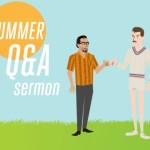We run our website the way we wished the whole internet worked: we provide high quality original content with no ads. We are funded solely by your direct support. Please consider supporting this project.
Why do you espouse Open Theism?
Open Theism refers to the belief that God created a world in which possibilities are real. It contrasts with Classical Theism which holds that all the facts of world history are eternally settled, either by God willing them so (as in Calvinism) or simply in God’s knowledge (as in Arminianism). Open Theists believe God created humans and angels with free will and that these agents are empowered to have “say so” in what comes to pass. In Open Theism, therefore, what people decide to do genuinely affects God and affects what comes to pass. In particular, by God’s own sovereign design, things really hang on whether or not God’s people pray.
The primary reason Open Theists believe what they do is because they find that Scripture presents the future as partly open. While there are certainly passages that depict God predetermining and foreknowing some aspects of the future, there are at least as many passages depicting God as facing a future partly comprised of possibilities. A small sampling of these sorts of passages are the following:
* The Lord frequently changes his mind in the light of changing circumstances, or as a result of prayer (Exod. 32:14; Num. 14:12–20; Deut. 9:13–14, 18–20, 25; 1 Sam. 2:27–36; 2 Kings 20:1–7; 1 Chron. 21:15; Jer. 26:19; Ezek. 20:5–22; Amos 7:1–6; Jonah 1:2; 3:2, 4–10). At other times he explicitly states that he will change his mind if circumstances change (Jer. 18:7–11; 26:2–3; Ezek. 33:13–15). This willingness to change is portrayed as one of God’s attributes of greatness (Joel 2:13–14; Jonah 4:2). If the future were exhaustively and eternally settled, as classical theism teaches, it would be impossible for God to genuinely change his mind about matters.
* God sometimes expresses regret and disappointment over how things turned out—even occasionally over things that resulted from his own will. (Gen. 6:5–6; 1 Sam. 15:10, 35; Ezek. 22:29–31). If the future was exhaustively and eternally settled, it would be impossible for God to genuinely regret how some of his own decisions turned out.
* At other times God tells us that he is surprised at how things turned out because he expected a different outcome (Isa. 5:3–7; Jer. 3:67; 19–20). If the future was eternally and exhaustively settled, everything would come to pass exactly as God eternally knew or determined it to be.
* The Lord frequently tests his people to find out whether they’ll remain faithful to him (Gen. 22:12; Exod. 16:4; Deut. 8:2; 13:1–3; Judges 2:20–3:5; 2 Chron. 32:31). If the future were eternally and exhaustively settled, God could not genuinely say he tests people “to know” whether they’ll be faithful or not.
* The Lord sometimes asks non-rhetorical questions about the future (Num. 14:11; Hos. 8:5) and speaks to people in terms of what may or may not happen (Exod. 3:18–4:9; 13:17; Jer. 38:17–18, 20–21, 23; Ezek. 12:1–3). If the future was exhaustively and eternally settled, God could never genuine speak about the future in terms of what “may” or “may not” happen.
So the Bible presents God as interacting with a world that is moving into a partly open future. This doesn’t mean that God could ever be caught off guard or that his overall purposes for the world are ever threatened. Because they believe God is infinitely intelligent, Open Theists affirm that God anticipates each and every possibility from the foundation of the world, as though it were a certainty. Whatever comes to pass, God has a plan in place to respond to it, bringing good out of evil when this is necessary. But, unlike Classical Theists, Open Theists are confident that God is so smart, he can sovereignly rule the world effectively without needing to have everything pre-settled in his will or mind ahead of time.
Category: Q&A
Tags: Open Theism, Q&A
Topics: Open Theism What it is and is not
Related Reading

What is the significance of Exodus 16:4?
The Lord commands the Israelites to gather only enough bread for one day while in the wilderness. “In that way,” the Lord says, “I will test them, whether they will follow my instruction or not.” Testing people to find out how they will resolve their character only makes sense if God is not certain of…

How People Misunderstand Open Theism
Open theism holds that, because agents are free, the future includes possibilities (what agents may and may not choose to do). Since God’s knowledge is perfect, open theists hold that God knows the future partly as a realm of possibilities. This view contrasts with classical theism that has usually held that God knows the future exclusively as a domain…

Greg and Paul Tag Team to Answer Your Questions
Greg Boyd and Paul Eddy answered questions submitted from Woodland Hills Church and podcasters during all three services this last Saturday and Sunday. They covered a wide range of topics so, chances are, you’ll find something here of interest to you. You can download audio or video from the three services below: Saturday evening service…

How do you respond to Acts 2:23 and 4:28?
Question: Acts 2:23 and 4:28 tell us that wicked people crucified Jesus just as God predestined them to do. If this wicked act could be predestined, why couldn’t every other wicked act be predestined? Doesn’t this refute your theory that human acts can’t be free if they are either predestined or foreknown? Answer: In Acts…

Open Theism and the Nature of the Future
In this philosophical essay Alan Rhoda, Tom Belt and I argue that the future cannot be exhaustively described in terms of what will and will not happen, but must also be described in terms of what may and may not happen. The future, in other words, is partly open. The thesis is defended against a…

How do you respond to Exodus 4:11?
“The Lord says to Moses, “Who gives speech to mortals? Who makes them mute or deaf, seeing or blind? Is it not I, the Lord?” According to some compatibilists, this passage teaches that all infirmities are willed by God. This interpretation is not required, however. Three things may be said. First, as a matter of…
